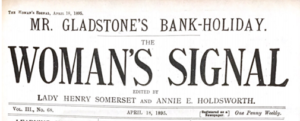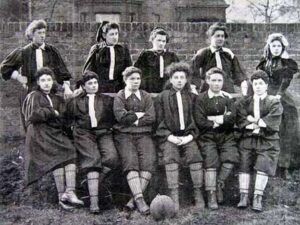A few months ago, I came across an article in an old periodical in our archives, which really caught my attention entitled ‘Should Women Play Football?’ dated 18th April 1895.
We have International Women’s Day on the 8th March this year, and one of the aims of this day is to celebrate women’s achievements. If we take a look at this article, I think we can agree that attitudes towards women playing football, have come a very long way since this piece was written. My eyebrows shot up at what seems like quite an unbelievable question to ask today, but in 1895 women playing in a football team was controversial.
The British Ladies’ Football Club was a women’s association football team formed in 1885. The club’s first public match took place in London in March 1895. This significant event may have instigated the inclusion of this article in The Woman’s Signal, posing the question ‘Should Women Play Football?
A shorter piece had already been published on 28th March 1895 in the Woman’s Signal periodical, just after the first match was played, seemingly alluding to the unjustified derision encountered by women footballers – ‘It is but cheap wit that can find jest in the costume of the women’s team or in broad allusions to the display of figure and form’. The women wore knickerbockers to play in, unrestricted by corsets and long shirts. Victorian society already had strong opinions regarding what was decent and proper for women, so this alone would have raised eyebrows.
It wasn’t just men who were disapproving, other women were too. Shortly afterwards in April 1895, a response letter was published about the Woman’s Football Match, where the writer Ellen, clearly states her disapproval of ‘such an unwomanly proceeding.’ She appears to be quite incensed that The Woman’s Signal have conveyed no disapproval when ‘women voluntarily…and for their own pleasure, publicly make this sorry exhibition of themselves.’ She goes on to highlight the dangers of the game ‘even for men; and therefore is doubly unsuitable for women….its danger proves its unsuitability for women, regardless of all questions of taste.’ Her hope that this was ‘….only a passing freak and…it will soon die out’, would fortunately not come to pass, especially for all the amazing footballers that have followed in the footsteps of those women determined to play on in the 1890’s.
At the time The Woman’s Signal, a weekly periodical, was edited by Lady Henry Somerset who was President of the National British Women’s Temperance Association (NBWTA, forerunner to the White Ribbon Association). Along with her temperance work, Lady Henry Somerset was a philanthropist and campaigner for women’s rights.
An advert for The Woman’s Signal classed the publication as ‘Quite the best woman’s paper in Great Britain’, and described it as ‘….a Weekly Review of Woman’s Work in Philanthropy and Reform’.
The advert states that ‘Among its Contributors are the best women writers of the day on Political, Social and Industrial questions.’ Interestingly the writer of the main article, appears to have been a man posing the question ‘Should Women Play Football?’.
The writer, having attended a dinner, became involved in a discussion where the subject of the ‘Woman’s Football Match’ was raised. Due to the ‘exclamations of disgust and incredulity’ displayed, some women present ‘apologised for their sisters and explained that the event was sporadic merely, and not a custom of the country.’ Guests at the dinner had ‘seen a game of football, it appeared, and thought it brutalising and degrading’. The writer countered to those involved in the discussion on the subject of women and what was acceptable, with the statement ‘that physical exercise developed certain valuable qualities of endurance, self devotion, and independence.’
The writer raised the questions – ‘First, what is Football? and secondly, what is a woman?’, as though if he could define this, it would provide him with the answer to the question if women should play. He goes onto confess however, that ‘whether owing to stupidity or to some other cause, I have not been able to hit upon what seems to me a satisfactory definition.’
The writer does recall playing football with his sister as a child, and that she was ‘quite an expert in all those games – cricket, football, etc.’ He points out that ‘Boys and girls can take part in it on common ground, and when they do the odds would be by no means heavily in favour of the boys.’
Conversely though, he states, ‘that kind of football (a game played by children under twelve or thirteen of both sexes) does not count’ and ‘No one would propose that a nursing mother or grandmother, should play at football or take any form of violent exercise.’ I think that the writer would take on many opponents today by his statement that ‘there are many women, who, owing to the wear and tear of motherhood, old age, etc, are quite incapable of entering the football field.’ He seems to have written off a percentage of the population in one foul swoop; women who would have undoubtably benefitted from the health and social aspects of a communal game and exercise!
However the writer goes on to declare that ‘….this brings us at once to the real fallacy which underlies all these discussions. It is assumed that a woman, merely as a woman, can do things or cannot do things, where no one in the world would think of raising such absurd questions about men. Women, it is necessary continually to repeat, are individual human beings, differing infinitely from one another. No two women are alike, and each individual woman, as individual as men, should be regarded as the sum of a multitude of factors, of which sex is only one. The question as to whether any male or any woman should play at football, depends not in least upon the question whether they are male or female, but whether they have the energy, the strength, the aptitude, and the taste for indulging in such a pursuit. All that we can do is insist, in this as in every other question that comes up, that sex, purely as sex, shall be no disqualification. A human being who is capable of doing anything, and doing it well, has God’s almighty charter to do it, and woe be to any impertinent usurper who ventures to say that she shan’t because she happens to belong to one and not to the other great half of the human family.’
It is unfortunate that the writer wasn’t keen on women playing football if they were nursing mothers, a grandmother or suffering from ‘wear and tear’ but I suppose we need to remember that it was 1895 and he was being more open minded that many. On one hand he was acknowledging that it should be a woman’s choice and not be about one’s gender, yet on the other, he is still placing limitations on a woman’s right to decide for themselves. He cannot fully relinquish his male opinion that certain specified women are ‘quite incapable of entering the football field’, therefore removing their freedom of choice.
He closes the article by telling the readers….’Men do what they think is good for them; they do what they want to do, without asking leave of women, and if women rightly appreciated the fact that they, equally with men, are human beings, with a right to develop the faculties which God has given them, they would dream just as little of asking men whether they should play at football or do any other things that they took it in their heads to do….but whether man or woman, I hope I would play if I wanted to play and thought it good for me, without asking the opinion of those who, by the fact that they are of a different sex to myself, cannot be qualified to decide such a question on my behalf.’
I think that we can all agree that whoever we are, we all have a right to play any game we choose. Others opinions should never stop us from doing something that we enjoy, just like those early women footballers.
For more information about International Womens Day – https://www.internationalwomensday.com/
#ChooseToChallenge
#IWD2021
‘We can all choose to challenge and call out gender bias and inequality. We can all choose to seek out and celebrate women’s achievements. Collectively, we can all help create an inclusive world.’
Image – The British Ladies’ Football Club, 1895. Picture credit: Wikimedia Commons.



